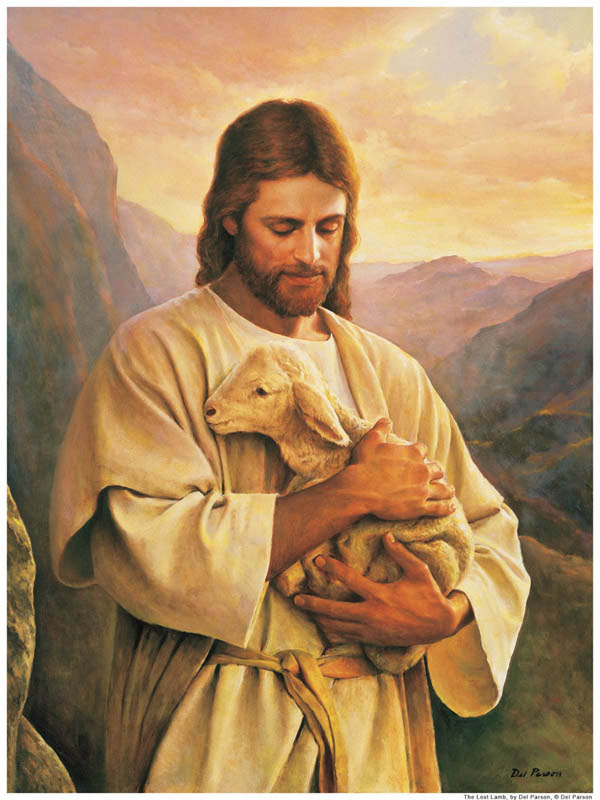Lamb of God
The Lamb of God, or sometimes the Lamb, is a name for the Savior Jesus Christ that is present throughout the scriptures. As written in John’s record in the New Testament, John the Baptist was baptizing throughout Bethabara when he saw Jesus of Nazareth approaching “to make request for that same ordinance.”[1]. John the Baptist directed his listeners to Jesus, saying, “Behold the Lamb of God, which taketh away the sin of the world.”[2]
The term Lamb of God refers to Jesus as a sacrifice for the sins of mankind or the sacrificial offering given in our behalf. Elder Jeffrey R. Holland explained the history of the term.
- After expulsion from the Garden of Eden, Adam and Eve faced a devastating future. Having opened the door to mortality and temporal life for us, they had closed the door to immortality and eternal life for themselves. Due to a transgression they had consciously chosen to make in our behalf, they now faced physical death and spiritual banishment, separation from the presence of God forever. What were they to do? Would there be a way out of this plight? We are not certain just how much these two were allowed to remember of the instruction they received while still in the garden, but they did remember they were to regularly offer for a sacrifice unto God a pure, unblemished lamb, the first male born of their flock.
- Later an angel came to explain that this sacrifice was a type, a prefiguration of the offering that would be made in their behalf by the Savior of the world who was to come. “This thing is a similitude of the sacrifice of the Only Begotten of the Father,” the angel said. “Wherefore, … thou shalt repent and call upon God in the name of the Son forevermore.” Fortunately, there was going to be a way out and a way up.
- In the premortal councils of heaven, God had promised Adam and Eve (and all the rest of us) that help would come from His pure, unblemished Firstborn Son, the Lamb of God “slain from the foundation of the world,” as the Apostle John would later describe Him. By offering their own little symbolic lambs in mortality, Adam and his posterity were expressing their understanding of and their dependence upon the atoning sacrifice of Jesus the Anointed One. Later, the wilderness tabernacle would become the setting for this ordinance and, after that, the temple that Solomon would build.
- Unfortunately, as a symbol of genuine repentance and faithful living, this ritualistic offering of unblemished little lambs didn’t work very well, as so much of the Old Testament reveals. The moral resolve that should have accompanied those sacrifices sometimes didn’t last long enough for the blood to dry upon the stones. In any case, it didn’t last long enough to preclude fratricide, with Cain killing his brother Abel in the first generation.
- With such trials and troubles going on for centuries, no wonder the angels of heaven sang for joy when, finally, Jesus was born—the long-promised Messiah Himself. Following His brief mortal ministry, this purest of all Passover sheep prepared His disciples for His death by introducing the sacrament of the Lord’s Supper, a more personal form of the ordinance that had been introduced just outside of Eden. There would still be an offering, it would still involve a sacrifice, but it would be with symbolism much deeper, much more introspective and personal than the bloodletting of a firstborn lamb. To the Nephites, after His Resurrection, the Savior said of this:
- “Ye shall offer up unto me no more the shedding of blood. …
- “… Ye shall offer for a sacrifice unto me a broken heart and a contrite spirit. And whoso cometh unto me with a broken heart and a contrite spirit, him will I baptize with fire and with the Holy Ghost. …
- “… Therefore repent, … and be saved.”[3]
Nephi taught his people that the law of Moses, which required them to sacrifice lambs, was intended to cast their minds toward Christ: “For this end hath the law of Moses been given; and all things which have been given of God from the beginning of the world, unto man, are the typifying of [Christ]” (2 Nephi 11:4).[4]
With our minds toward Christ, we offer “a broken heart and a contrite spirit” (3 Nephi 9:20) “We are also asked to comply with the principles of sacrifice by obeying the commandments, offering precious gifts of love, time, and service, and remembering the sacrifice of our Savior. Our sacrifices deepen our worship, acknowledge our debt to God, and express gratitude for our blessings.”[5]
As the Lamb of God, Jesus was sacrificed for men, and salvation only comes because of the shedding of his blood. (Mosiah 3:18) Those who gain eternal life will have done so by accepting the gospel of Jesus Christ and by being baptized by the proper priesthood authority. They will have taken on the covenants in the holy Temple of God; they will have repented and made themselves "clean in the sight of God", and will continually strive each day to live a life worthy of the Savior's presence in eternal life. When each has done all that the Savior has asked, then through the Atonement of Jesus Christ, He will make up the difference.
